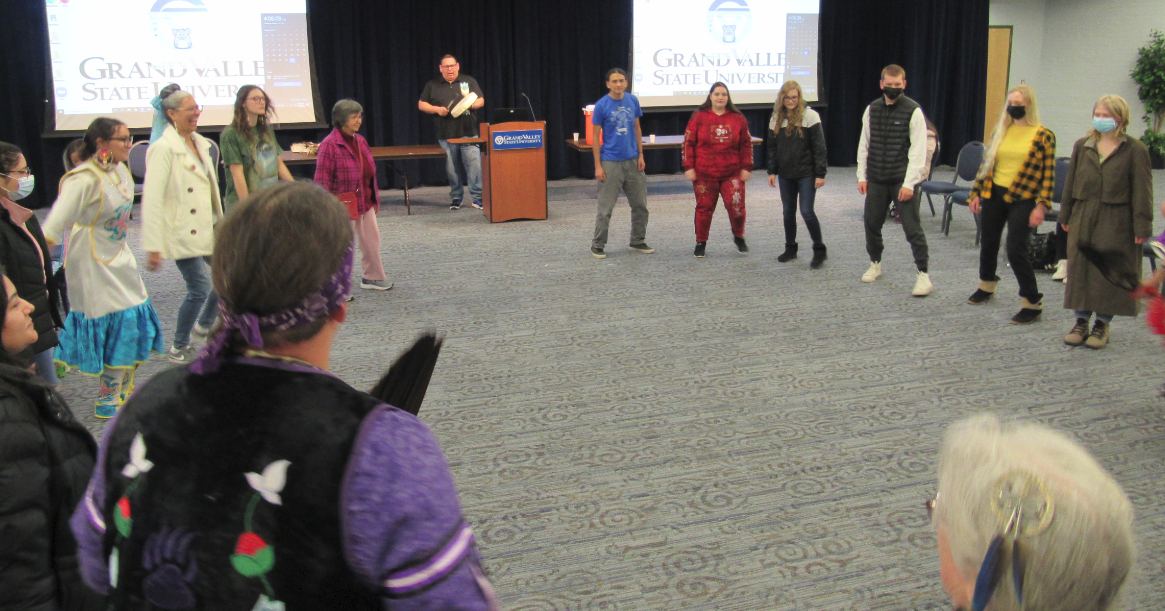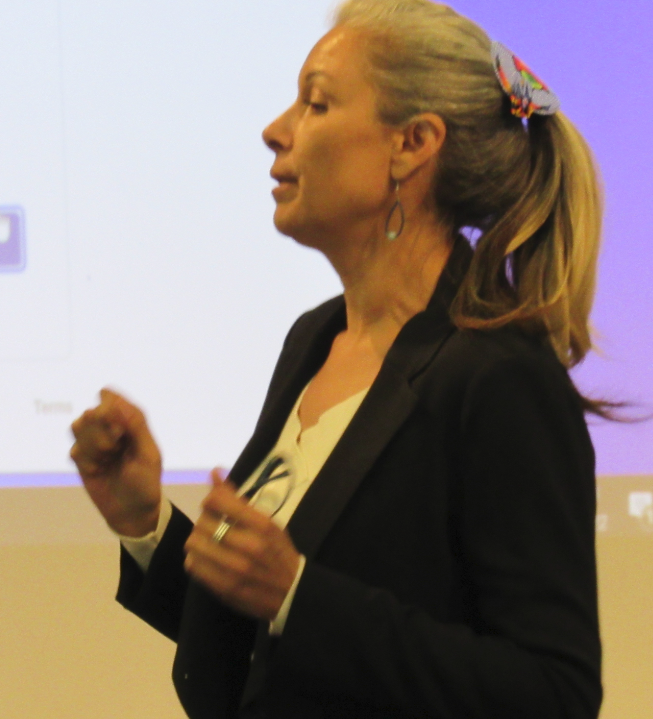
- Details
- By Levi Rickert
Grand Valley State University's Office of Multicultural Affairs closed out the month of March with Indigi-Fest, a 2022 expo experience that celebrated Anishinabeck heritage with local speakers and perforrmers.
Indigi-Fest was held in lieu of the spiring powwow because of the COVID-19 threat. Grand Valley State University is located in Allendale, Mich. with other campuses in West Michigan.
"Instead of our traditional spring powwow, our Native American Student Association (NASA) decided to conduct a campus cultural exchange in a way that encouraged open dialogue with our presenters. We had various university classes come to our presentations as part of their curriculum," Lin Bardwell (Little Traverse Bay Bands of Odawa Indians), Native American Student Initiative Coordinator at Grand Valley State University said. "This lent itself to personal engagement between our local Indigenous community and our campus community."

Attendees heard about Anhishnabe heritage with presentations on the Indiegnous food sovereignty movement, traditional black ash basket making and wood carving.
On both days the afternoon session ended with powwow dancers and a drum. Students were afforded explanations on various powwow dances.
"The regalia that we wear comes to us in a divine way. It comes to us through the colors and feathers. It's laid upon us through the spirit. We believe that the creation and the manifestation of this regalia is a spiritual thing," Punkin Shananaquet (Potawotami/Ojibwe), a respected jingle dress dancer from Hopkins, Mich., explained to the students.
"It's a bond between us and the Creator, between us and our children, between us and our spirits, between us and my spirit name, and between us and our planet," Shananquet continued.
Because powwows were not geneally accepted by non-Native people during much of the 1900s, Shananquet said Native people did not have books on how to make their regalia. As the powwows became more accepted during the 1970s, especially after the American Indian Religious Freedom Act was enacted in 1978, Native people had to rely on the spiritual inspiration to create the regalia worn by powwow dancers.
Mike Medawis (Ottawa/Potawatomi/Ho-Chunk) provided drumming and singing on Thursday. He spoke about various songs that are given for thanksgiving and honor.
"There is a responsibility that goes with singing and drumming. I've been blessed because I learned to drum as a kid. There were programs that I went to practice. So, I'm thankful for that," Medawis said.
Free Indigenous food samples, such as wild rice, were offered.
Bardwell says the event was so successful, Indigi-Fest will be back on campus next year.
-
 Arthur Zapaoa (Comanche) Arthur Zapaoa (Comanche)
Arthur Zapaoa (Comanche) Arthur Zapaoa (Comanche) -
 Grand Entry Grand Entry
Grand Entry Grand Entry -
 Lori Shustha (Odawa/Mohawk) waiting to dance. Lori Shustha (Odawa/Mohawk) waiting to dance.
Lori Shustha (Odawa/Mohawk) waiting to dance. Lori Shustha (Odawa/Mohawk) waiting to dance. -
 Punkin Shananaquet (Potawatomi/Ojibwe) explains various aspects of powwows. Punkin Shananaquet (Potawatomi/Ojibwe) explains various aspects of powwows.
Punkin Shananaquet (Potawatomi/Ojibwe) explains various aspects of powwows. Punkin Shananaquet (Potawatomi/Ojibwe) explains various aspects of powwows. -
 Alaysia Brewer (Sault Ste. Marie Tribe) Alaysia Brewer (Sault Ste. Marie Tribe)
Alaysia Brewer (Sault Ste. Marie Tribe) Alaysia Brewer (Sault Ste. Marie Tribe) -
 Grand Entry Grand Entry
Grand Entry Grand Entry -
 Mike Medawis (Ottawa/Potawatomi/Ho-Chunk) Mike Medawis (Ottawa/Potawatomi/Ho-Chunk)
Mike Medawis (Ottawa/Potawatomi/Ho-Chunk) Mike Medawis (Ottawa/Potawatomi/Ho-Chunk) -
 Bryson Medawis, Mike Medawis' son Bryson Medawis, Mike Medawis' son
Bryson Medawis, Mike Medawis' son Bryson Medawis, Mike Medawis' son -
 Grand Entry Grand Entry
Grand Entry Grand Entry -
 Grand Entry Grand Entry
Grand Entry Grand Entry -
 Neely Bardwell (Little Traverse Bay Bands of Odawa Indians) Neely Bardwell (Little Traverse Bay Bands of Odawa Indians)
Neely Bardwell (Little Traverse Bay Bands of Odawa Indians) Neely Bardwell (Little Traverse Bay Bands of Odawa Indians)
https://nativenewsonline.net/education/grand-valley-state-university-celebrates-native-culture#sigProId3e369ab4ff
More Stories Like This
Hanging a Red Dress for Christmas: MMIP, Native Higher Education, and Hope for a Better New YearNative Students Can Win $5,000 Scholarship, International Distribution in Pendleton Design Contest
American Indian College Fund Raises Alarm Over Plan to Shift Native Programs Away From the Dept. of Education
MacKenzie Scott Foundation Gives $5 Million Contribution to Little Priest Tribal College
Tribal Leaders Push Back on Dismantling of U.S. Department of Education
Help us defend tribal sovereignty.
At Native News Online, our mission is rooted in telling the stories that strengthen sovereignty and uplift Indigenous voices — not just at year’s end, but every single day.
Because of your generosity last year, we were able to keep our reporters on the ground in tribal communities, at national gatherings and in the halls of Congress — covering the issues that matter most to Indian Country: sovereignty, culture, education, health and economic opportunity.
That support sustained us through a tough year in 2025. Now, as we look to the year ahead, we need your help right now to ensure warrior journalism remains strong — reporting that defends tribal sovereignty, amplifies Native truth, and holds power accountable.
 The stakes couldn't be higher. Your support keeps Native voices heard, Native stories told and Native sovereignty defended.
The stakes couldn't be higher. Your support keeps Native voices heard, Native stories told and Native sovereignty defended.
Stand with Warrior Journalism today.
Levi Rickert (Potawatomi), Editor & Publisher


